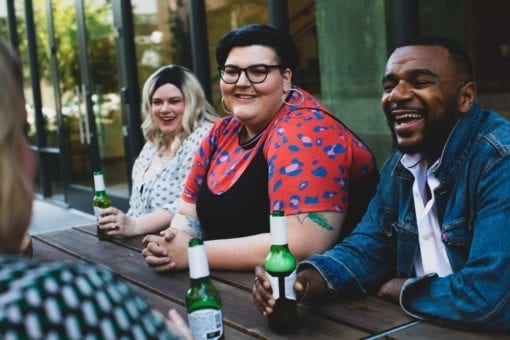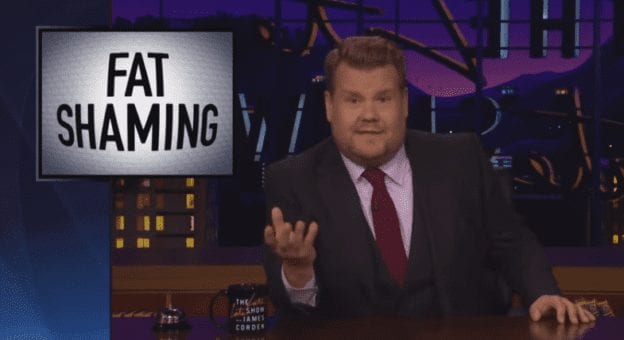CN: Discussion of fat-shaming
Bill Maher aired a segment recently about fat-shaming. His “hot take” on the issue was, from what I understand (I haven’t watched the segment in full to protect my mental health), that our society should “bring back” fat-shaming to get people to lose weight. That our society has gone too far in accepting people of higher weights. James Corden responded to the segment, and he got a lot of things right. He also made me wince a few times, and I’d like to explain why.

What James Corden Got Right About Fat-Shaming
“Fat shaming hasn’t gone anywhere,” Corden said. He’s absolutely right about that. People in higher weight bodies are reminded every time we try to fly, shop for clothes, go out to eat or see a play or concert. We’re reminded at the doctor’s office and when our health conditions are overlooked, dismissed and often incorrectly attributed to our weight.
Corden also said that fat-shaming only does one thing: it makes people feel ashamed. It leads to depression, anxiety, health issues and difficulty engaging in activities like eating in a nourishing way. Corden explains that fat-shaming is just bullying. It’s a specific kind of bullying, but it’s bullying. Bullying has a significant impact on people, and especially children. It can lead to life-long difficulties, including chronic depression, self-harm and post-traumatic stress disorder. It shouldn’t be taken lightly, and it certainly shouldn’t be “brought back.”
Corden goes on to explain that the issue is a lot more complex than Maher made it out to be, and that is also true. Lots of different things play a role in our body size: genetics, our environment, food availability, our metabolism and our health all play a role. Our bodies are complex, and simplifying the issue doesn’t do anyone any good.

Photo featuring plus-size model by Michael Poley of Poley Creative for AllGo, publisher of free stock photos featuring plus-size people.
Where James Corden Missed the Mark
What made me sad were Corden’s comments about his own weight, and that being overweight isn’t good for us. Health and size are two different things. People of any size can be healthy or unhealthy, and health is complex. A person’s health can’t be measured by their size.
Even more dangerous, though, is the idea that we need to be healthy and do “healthy” things to be respected. That if we live in a larger body and have health issues, we’ve brought it on ourselves. Health isn’t that simple, and everyone deserves respect regardless of health status. To think otherwise is inherently ableist.
Corden also discusses his history of dieting. Dieting and food restriction doesn’t work. Our bodies don’t tolerate restriction well, whether it’s mental or physical. Intuitive eating offers a better path, allowing us to eat without restriction and in a way that really nourishes our bodies. Intuitive eating helps us separate what we eat from the idea that we need to change our body size through food.
Corden talked about his weight, and that he considers it to be a “lifelong struggle.” It doesn’t have to be a lifelong struggle, though. We don’t need to spend every day fighting our bodies, even if it seems like our society expects us too.
Health at Every Size® makes this clear. HAES is a framework for understanding and affirming diversity in health. The first principle is weight inclusivity, which asks us to accept and respect bodies of all shapes and sizes, without idealizing or pathologizing any of them. Our bodies aren’t inherently flawed, and we don’t need to fight them at every turn. Instead, we should care for our bodies, eating foods that feel good and right and moving in ways that are affirming and enjoyable.
Finding Peace
I’ve seen a range of reactions to Corden’s response. Some love it, some are disappointed in it. I think it’s a good start and I hope that Corden finds his way to resources to help him learn to accept his body rather than apologize for it. I hope he finds ways to eat that don’t involve guilt, shame and restriction, and ways to move that bring him joy. I hope he finds peace and doesn’t always feel at war with his body.
I appreciate the way he stood up for people in higher weight bodies, which can’t be easy in an industry that still has some serious diversity problems when it comes to body size (and a host of other areas). I’m glad he’s said his piece and that it’s getting attention. I wish it were a bit more balanced, but perhaps it can be a starting point for a larger conversation on ending weight stigma and the bullying of people in larger bodies.
I have wishes for Bill Maher too, but I won’t list them here.
Melinda Sineriz is a freelance writer and fat acceptance advocate. Read more of her thoughts on Twitter or visit her website to learn more.
Health At Every Size and HAES are registered trademarks of the Association For Size Diversity And Health.
